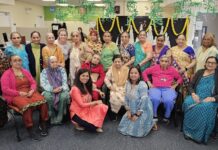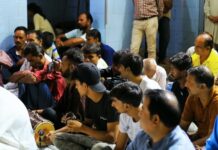
CHICAGO: Metropolitan Asian Family Services (MAFS) has joined hands with Northwestern University Feinberg School of Medicine to conduct a new Healthy Lifestyle study with main thrust on prevention of heart disease.
The near two years study commencing August this year is primarily focused on South Asians population in as much as this segment of the community is believed to have a relative high incidence of heart problems. The study commencing is funded by US National Institute of Health.
Dr. Namratha Kandula and her team from Northwestern University, Feinberg School of Medicine, conducted an informative healthy lifestyle workshop at Metropolitan Asian Family Services (MAFS) on June 20. The goal of the study is to teach the Indian and Pakistani community about how to reduce their chances of a heart attack through a healthy lifestyle.
Twenty-one MAFS staff members from all locations attended this interesting, interactive workshop on heart disease prevention. The staff learned new ways to incorporate healthy living in their daily lives. Group activities were used to teach people how to make healthier eating choices, read nutrition labels, and get more exercise. Staff members were also certified on how to conduct blood pressure, weight, and body mass index measurements.
It is observed and is backed up by some studies too that South Asians are less physically active than many other groups. The sedentary lifestyle of South Asians may be contributing to their higher rates of diabetes and heart disease. It is important for the South Asian community to think of ways to become more physically active and to also encourage children to be more active.
In a talk to this paper, Dr Kondula said that regular physical activity has physical, mental, and emotional benefits. All people, men and women, children, older adults, need to get regular physical activity. It is recommended that all adults get at least 30 minutes or moderate-intensity physical activity on most days of the week. Examples of moderate-intensity activity include brisk walking, cycling, or dancing.
There are countless ways to enjoy physical activity:
* Instead of watching television after dinner, go for a walk;
* Play tag, swim, toss a ball, jump rope, and dance to your favorite music;
* Race with your kids. When is the last time you ran fast for 20-30 seconds?
* Take the stairs whenever you can.
* Celebrate special occasions – like birthdays or anniversaries – with something active, such as a hike or playing a game at the park.
* Get the whole family involved in household chores like vacuuming and yard work.
* Walk instead of drive whenever you can. If you have to drive, find a spot at the far end of the parking lot and walk to where you’re going.
* Get off the bus a stop earlier than usual and walk the rest of the way
* Limit the amount of time at home that you and your family spend in front of a computer or television. No more than 1-2 hours a day.
* When you are watching television, get up and move during commercial breaks.
* When you are at work, make sure to get up every 30 minutes and stand or go get some water.
Dr Kondula observed that “many people say that they do not have the time to do any exercise. But the truth is that these people do not make the time for exercise. We need to set the right example for our communities by making physical activity a priority in our own lives.”
The lifestyle study with the thrust on preventing heart disease will be conducted at MAFS locations and there with be three to four groups. Each group will be required to attend six classes. The study would be revealing in more than one way as it would have a peek at the reasons for prevalence of cardiovascular disease among South Asians and it will be enlightening for the groups participating in the studies.
Namratha Kandula, MD, MPH who is in charge of the two year study, is Assistant Professor of Medicine at Northwestern University’s Feinberg School of Medicine. She is a general internist with advanced training in epidemiology, public health, and health services research.
Dr. Kandula is an expert in Asian American health, cross-cultural communication, and health promotion for minority communities. She currently directs an ongoing research program to develop, implement, and evaluate literacy and culturally appropriate behavioral interventions targeted at cardiovascular risk reduction in minority populations. She is a recipient of a Mentored Patient-Oriented Research Career Development Award (K23) from the National Heart, Lung, and Blood Institute (NHLBI) and the Site-PI of the NHLBI-funded MASALA study, the first prospective cohort study examining the mediators of atherosclerosis in South Asian Americans.
She serves as a National Advisory Committee Member for the Robert Wood Johnson Foundation’s Local Funding Partnerships program and is a graduate of the Community Leadership Program run by the Leadership Center for Asian Pacific Americans.
Those interested in participating in this research study please contact 773 475 3105.
Himali Bharucha






